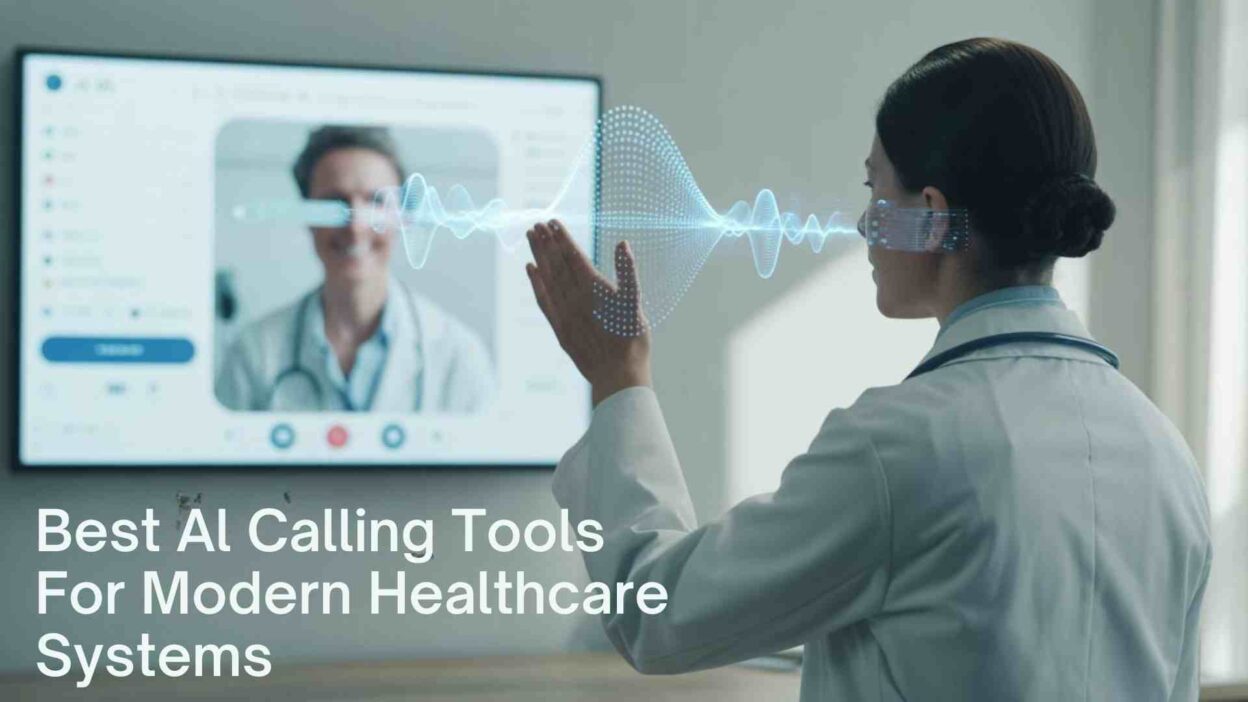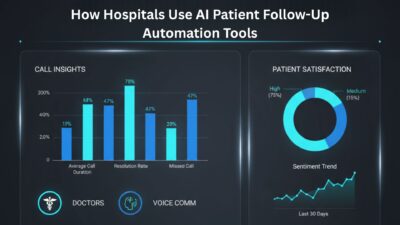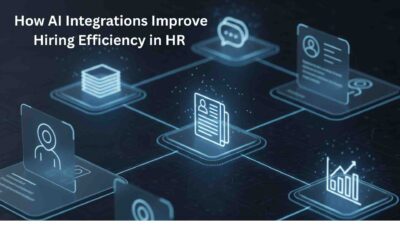TL;DR Patients wait on hold for hours. Staff spend entire days answering phones. Appointments get forgotten by patients. Healthcare providers struggle with communication challenges. Modern technology offers solutions to these problems. Artificial intelligence transforms how healthcare systems manage calls. The best AI calling tools for modern healthcare systems revolutionize patient communication. These tools automate routine tasks and improve care quality. They free staff to focus on patient care directly.
Table of Contents
The Revolution of AI Calling in Healthcare
Healthcare communication has undergone a massive transformation. Traditional phone systems required extensive staff. Receptionists answered calls all day. Staff members manually scheduled appointments. Follow-up calls consumed significant resources. Patient satisfaction suffered. Errors occurred, manual processes handled information.
The best AI calling tools for modern healthcare systems address these limitations directly. Artificial intelligence handles routine calls automatically. Patients receive instant responses without waiting. Appointments get scheduled without human intervention. Reminders prevent missed appointments. Follow-up care becomes systematic and reliable.
Healthcare providers recognize the value of these tools. Modern systems integrate AI seamlessly into operations. Patients experience better service. Providers reduce operational burden. Healthcare quality improves across the board.
How Healthcare Systems Traditionally Managed Calls
Traditional healthcare communication relied on human staff. Phone lines connected to reception areas. Receptionists answered every single call. They gathered patient information manually. They wrote information on paper or into basic systems. Errors crept into this manual process naturally.
Scheduling appointments required significant time. Receptionists checked calendars manually. They coordinated between multiple providers. They managed complex scheduling constraints. Patients often waited on hold, calendars opened. Frustration mounted as wait times increased.
Staff performed follow-up calls manually as well. Nurses called patients after procedures. Doctors called with test results. Appointment reminders required extensive staff time. Staff called repeatedly, patients did not answer. Resources are stretched thin managing routine communication.
Patient satisfaction suffered under traditional systems. Long wait times frustrated patients. Missed appointments disrupted schedules. Important information sometimes gets lost. Patients received inconsistent information from different staff members. Errors damaged trust between patients and providers.
Administrative burden consumed enormous resources. Staff spent forty percent of their time on phone-related tasks. Appointment scheduling and follow-up dominated the workflow. Clinician time focused on administrative tasks. Efficiency suffered.
Cost analysis revealed inefficiency clearly. Staff salary expenses for call management proved substantial. Missed appointments reduced revenue directly. Inefficient scheduling wasted provider time. Healthcare organizations realized change was necessary.
The Emergence of Best AI Calling Tools for Modern Healthcare Systems
Artificial intelligence offers practical solutions. Machine learning algorithms analyze patient communication patterns. Natural language processing understands patient needs instantly. Voice recognition technology transcribes calls accurately. The best AI calling tools for modern healthcare systems automate healthcare communication completely.
Early AI calling systems focused on simple tasks. Appointment reminders reached patients automatically. Confirmation calls happened without staff involvement. Basic information distribution occurred via automated calls. These simple applications delivered immediate benefits.
Advanced systems now handle complex interactions. Patients describe symptoms naturally. AI understands medical terminology and patient descriptions. Triage systems assess urgency automatically. Patients receive appropriate routing to providers. Complex cases reach human staff.
Integration with healthcare infrastructure progressed rapidly. Electronic health records now connect with AI systems. Patient data flows seamlessly between systems. Call histories are attached to medical records. Providers access the complete communication history. Care becomes truly coordinated.
The best AI calling tools for modern healthcare systems now represent an industry standard. Healthcare organizations cannot compete without these tools. Patient expectations demand advanced communication. Regulatory requirements favor systematic communication. Implementation has become essential.
Key Features of Best AI Calling Tools for Modern Healthcare Systems
Successful AI calling systems share common features. These features determine tool effectiveness. Understanding critical features helps healthcare leaders choose appropriate solutions.
Natural Language Processing Capabilities
Natural language processing enables AI to understand patient communication. Patients describe symptoms in natural language. They explain their medical history. They express concerns and fears. Traditional systems cannot process this complexity. Natural language processing systems understand meaning effortlessly.
The best AI calling tools for modern healthcare systems use advanced language models. These models understand medical terminology completely. They recognize symptoms described in layman’s terms and detect emotional content and concern levels. Distinguish between serious and minor issues.
Accurate symptom assessment improves triage outcomes. AI systems categorize patient issues correctly. Urgent cases reach clinicians immediately. Routine issues get routine responses. System efficiency maximizes clinician time.
AI systems maintain conversational flow naturally. Patients feel understood by the system. Interactions feel human-like. Patients accept recommendations readily, communication feels natural. Satisfaction increases.
The best AI calling tools for modern healthcare systems adapt to different communication styles. Some patients prefer brief interactions. Others want detailed information. AI systems adjust their approach automatically. Patients with English as a second language receive appropriate support. Accessibility features serve diverse populations.
Integration with Electronic Health Records
Electronic health records contain complete patient information. Medical histories document past treatments. Medication lists inform drug interaction concerns. Allergy information prevents medication errors. Test results guide recommendations. The best AI calling tools for modern healthcare systems access this information seamlessly.
Real-time EHR access enables personalized interactions. AI systems know each patient’s medical background. They reference previous visits and treatments and recall past medication allergies. Remember patient preferences and communication wishes. Conversations feel personal and informed.
Call histories integrate into medical records automatically. Healthcare providers review complete communication records. They understand why patients called and know what information patients have already received. Avoid repeating information. Care becomes truly coordinated.
Two-way information flow strengthens healthcare delivery. AI systems update EHRs with new information. Patient-reported symptoms enter the medical record. Medication changes get documented. Follow-up recommendations appear in the chart. Future providers access this information immediately.
The best AI calling tools for modern healthcare systems improve care continuity. Patients receive consistent information across all contacts. Provider understanding deepens with each interaction. Medical errors decrease, information is complete. Patient outcomes improve measurably.
Patient Data Security and Compliance
Healthcare data is extremely sensitive. Privacy laws strictly regulate patient information. HIPAA imposes penalties for breaches. Patient trust depends on security. The best AI calling tools for modern healthcare systems prioritize security absolutely.
Encryption protects data in transit and storage. Calls between patients and AI systems use encrypted connections. Stored audio files use encryption. Transcribed data stays protected. Unauthorized access becomes virtually impossible.
Access controls limit who views patient information. Only authorized healthcare staff have access to patient data. AI systems access only the necessary information. Audit trails track all access. Suspicious access triggers alerts. Security remains constantly monitored.
The best AI calling tools for modern healthcare systems comply with healthcare regulations fully. HIPAA standards guide system design. State privacy laws receive attention. International regulations become relevant for global healthcare organizations. Compliance built into systems prevents violations.
Data anonymization protects patient privacy in research. AI systems learn from vast amounts of data. This data must remain private. Anonymization removes identifying information. Researchers benefit from data insights. Patients remain protected.
Patient consent remains central to security. Patients authorize data use. They choose communication preferences and decline recordings. Control information sharing. Consent is documented and stored. Patient autonomy is respected fully.
Top Categories of Best AI Calling Tools for Modern Healthcare Systems
Healthcare organizations deploy AI calling tools for multiple purposes. Different tools solve different problems. Understanding categories helps organizations prioritize implementation.
Appointment Scheduling and Reminder Systems
Appointment scheduling represents one of the best AI calling tools for modern healthcare systems. Patients call to schedule appointments. AI systems access provider calendars instantly. They find available time slots. They confirm patient preferences. Scheduling completes in minutes without human intervention.
The best AI calling tools for modern healthcare systems reduce scheduling errors. No more double-bookings occur. Time conflicts disappear. Provider preferences get respected. Patient preferences are documented. Accuracy improves.
Automated reminders prevent missed appointments. Patients receive calls twenty-four hours. SMS messages arrive twelve hours prior. Email reminders appear three hours ahead. Multiple reminders increase attendance rates. No-show rates drop dramatically.
Patients appreciate reminder calls. They forget and reschedule, they cannot attend. Give advance notice to the provider. Cancellations decrease disruption. Appointment schedules flow smoothly.
The best AI calling tools for modern healthcare systems handle rescheduling automatically. Patients cannot attend, AI offers times. Patients choose rescheduled appointments immediately. Staff do not need to manage rescheduling. Calendars stay organized and optimized.
Emergency appointment requests receive priority handling. Urgent patients reach next-available appointments. Critical cases get expedited scheduling. The system triages based on urgency. Patient outcomes improve, urgent care happens quickly.
Patient Engagement and Follow-Up Tools
Follow-up care determines long-term health outcomes. Patients need support after procedures. They need encouragement to take medications. They need monitoring for complications. Traditional systems struggled with systematic follow-up. The best AI calling tools for modern healthcare systems ensure consistent follow-up.
Automated follow-up calls occur at optimal times. Post-procedure check-ins happen automatically. Medication reminders reach patients regularly. Chronic disease monitoring stays on schedule. Patients appreciate the consistent attention. Health outcomes improve measurably.
The best AI calling tools for modern healthcare systems personalize follow-up interactions. Patients recovering from surgery receive relevant questions. Diabetic patients get appropriate monitoring calls. Heart patients receive cardiac-specific follow-up. Each patient receives customized care.
Patient reporting becomes systematic and organized. Patients report symptoms through simple calls. They describe their condition in their own words. They answer routine monitoring questions. AI systems understand their responses. Critical information reaches providers immediately.
Patient engagement improves healthcare adherence. Patients feel supported between visits. They experience consistent care and attention and develop stronger relationships with providers. Comply better with treatment plans. Health outcomes improve.
The best AI calling tools for modern healthcare systems detect complications early. Unusual symptoms trigger clinician alerts. Concerning trends, prompt intervention. Preventable emergencies get prevented. Hospital admissions decrease. Costs decline substantially.
Administrative Automation Solutions
Administrative tasks consume enormous healthcare resources. Insurance verification requires lengthy phone calls. Prior authorization paperwork creates delays. Billing questions tie up staff. The best AI calling tools for modern healthcare systems handle these administrative tasks automatically.
Insurance verification happens instantly through AI systems. Patients answer verification questions. The system checks insurance coverage. Deductibles get calculated automatically. Authorization requirements are identified. Billing staff receives complete information. Processing speeds increase dramatically.
Prior authorization requests get processed faster. AI systems gather necessary clinical information. They submit the required documentation. Insurance companies receive complete applications. Approval happens more rapidly. Patient care proceeds. Frustration decreases for all parties.
Billing inquiries receive immediate attention. Patients call with payment questions. AI systems access billing records instantly. They explain charges clearly and discuss payment options. Accept payment information securely. Human staff focus on complex issues only.
The best AI calling tools for modern healthcare systems reduce billing errors. Accurate information entry prevents mistakes. Charges get documented correctly. Payment records stay organized. Auditing becomes easier. The revenue cycle improves.
Staff productivity increases substantially. Administrative personnel handle fewer routine calls. They focus on complex billing issues. They manage exceptions and special cases. Healthcare providers reduce administrative staff needs. Labor costs decrease without service reduction.
Implementation Benefits of Best AI Calling Tools for Modern Healthcare Systems
Healthcare organizations experience significant benefits from AI calling implementation. These benefits justify technology investment. Measuring benefits guides future improvement efforts.
Efficiency Improvements in Patient Care
Clinician time is valuable and scarce. Reducing administrative burden frees clinicians for patient care. The best AI calling tools for modern healthcare systems eliminate administrative phone calls. Clinicians focus on medical decision-making. Patient interaction time increases. Care quality improves.
Wait times decrease, AI handles calls. Patients reach appropriate resources faster. Urgent cases get priority. Routine questions get quick answers. Patient satisfaction increases. Emergency departments experience reduced overflow.
Call handling capacity expands dramatically. A single AI system handles hundreds of simultaneous calls. Multiple staff members would be necessary to achieve this volume. Healthcare organizations serve more patients. Revenue increases with improved capacity.
The best AI calling tools for modern healthcare systems improve staff satisfaction. Repetitive call handling causes burnout. Staff prefer meaningful work. Administrative automation reduces frustration. Employee retention improves. Recruitment becomes easier.
Care coordination improves, information flows. AI systems provide complete context. Care team members understand patient situations. Multiple clinicians access consistent information. Care becomes truly integrated. Patient outcomes improve.
Cost Reduction and Operational Savings
Staffing represents the largest healthcare expense. Administrative staff handle many phone-related tasks. Reducing administrative work reduces staffing needs. The best AI calling tools for modern healthcare systems decrease labor costs substantially.
Salary expenses decline, automation reduces staff requirements. Benefits costs decrease. Recruiting and training costs disappear. Facilities need to decrease. Overhead diminishes. Cost per patient interaction decreases.
No-show rates drop, AI sends reminders. Missed appointments represent lost revenue. Reminders prevent no-shows. Provider schedules stay full. Revenue per provider increases. Profitability improves.
Emergency department overcrowding decreases with better triage. Inappropriate ED visits decline. Hospital admission costs decrease. Patients receive care at appropriate levels. Healthcare costs decline.
The best AI calling tools for modern healthcare systems reduce billing cycle time. Faster billing means faster revenue. The insurance claims process is quicker. Payment arrives sooner. Cash flow improves. Financial stability increases.
Hospital-acquired infections decrease, follow-up monitoring identifies complications early. Pre intervention prevents complications. Hospital readmissions decline. Healthcare costs decrease. Patient’s suffering diminishes.
Enhanced Patient Satisfaction
Patients value responsive healthcare organizations. They appreciate quick appointment scheduling, like timely reminders and enjoy follow-up care. The best AI calling tools for modern healthcare systems deliver all of this automatically.
Wait times frustrate patients. Reduced wait times improve satisfaction dramatically. Quick scheduling demonstrates respect for patient time. Efficient processes feel professional. Patients return for future care. They recommend providers to others.
Personalized care increases satisfaction. AI systems remember patient preferences. They respect communication preferences. They provide customized information. Patients feel understood and valued. Strong doctor-patient relationships develop.
Patient outcomes improve. Follow-up care prevents complications. Early intervention stops serious issues. Chronic disease management improves. Patients live longer. They experience a better quality of life.
Patients trust organizations that protect their data. Security measures reassure patients. Privacy protection demonstrates professionalism. Patients feel safe sharing information. Doctor-patient relationships strengthen. Patients become advocates for the organization.
The best AI calling tools for modern healthcare systems create positive patient experiences. Patients remember good experiences. They return repeatedly. They recommend providers enthusiastically. Word-of-mouth marketing improves. Reputation strengthens.
Challenges and Solutions
Healthcare AI implementation faces real obstacles. Understanding challenges helps organizations prepare. Solutions mitigate these challenges effectively.
Integration Challenges
Electronic health records contain critical patient information. Integrating AI systems with EHRs requires technical expertise. Legacy EHR systems use outdated technology. Integration becomes complicated with old systems. Data mapping requires careful attention. Testing must verify accuracy.
The best AI calling tools for modern healthcare systems come from different vendors. Multiple tools must work together. Data standards enable integration. APIs connect different systems. Middleware translates between systems. Enterprise architecture guides integration planning.
Healthcare organizations deploy many clinical systems. Appointment systems, billing systems, pharmacy systems, and lab systems exist independently. Integrating AI with all of them is complex. Careful planning prevents system conflicts. Phased implementation manages complexity.
Solutions exist for these challenges. Healthcare IT departments develop integration strategies. Vendors provide integration support. Standards like HL7 and FHIR facilitate data exchange. Organizations invest in integration tools. Success requires planning and expertise.
Privacy and Security Concerns
Patient data is vulnerable in the transmission. Healthcare breaches make headlines. Patients lose trust, data is compromised. Healthcare organizations face regulatory penalties. Security is not optional. The best AI calling tools for modern healthcare systems must be absolutely secure.
Encryption protects data in the transmission. Secure connections prevent eavesdropping. Stored data remains encrypted. Only authorized users access information. Multi-factor authentication prevents unauthorized access. Security measures build patient confidence.
HIPAA violations result in massive penalties. Breaches trigger investigation. Notifications cost significant money. Reputation damage occurs inevitably. Organizations must prevent breaches completely. Compliance is not negotiable.
Solutions include regular security audits. Penetration testing reveals vulnerabilities. Security training educates staff. Incident response plans prepare for emergencies. Cyber insurance provides financial protection. Comprehensive security prevents breaches.
The best AI calling tools for modern healthcare systems include security by design. Developers build security into systems. Regular updates patch vulnerabilities. Monitoring detects suspicious activity. Third-party security audits verify protection. Security remains paramount.
Staff Training Requirements
New technology requires staff training. Staff must understand system capabilities. They must know how to use tools effectively. They must understand privacy requirements. Inadequate training leads to underutilization. Organizations must invest in training.
Training takes time and resources. Some staff resist change. Learning curves vary by individual. Ongoing support helps staff succeed. Dedicated trainers accelerate adoption. Documentation provides reference materials.
The best AI calling tools for modern healthcare systems should include training resources. Vendors provide comprehensive training. Online tutorials offer flexible learning. Certification programs develop expertise. Ongoing support helps staff. Good tools include good training.
Solutions involve commitment to training. Organizations budget training time. They designate training champions and create feedback mechanisms. Celebrate successful adoption. Address resistance constructively. Training programs lead to successful implementation.
Frequently Asked Questions
What types of calls can AI systems handle?
The best AI calling tools for modern healthcare systems handle many call types. Appointment scheduling calls work perfectly. Reminder calls happen automatically. Follow-up questions get answered. Billing inquiries receive responses. Insurance verification complete. Medication refill requests process. Symptom reporting happens. Routine calls are handled well. Complex calls route to staff appropriately.
Are patients comfortable talking to AI systems?
Most patients accept AI calls readily. Older patients sometimes need reassurance. Clear communication about AI helps acceptance. Natural-sounding voices improve comfort. Quick call resolution builds confidence. Patients appreciate efficiency. The best AI calling tools for modern healthcare systems sound natural. Patient resistance diminishes over time. Satisfaction improves as comfort increases.
How do AI systems ensure data privacy?
The best AI calling tools for modern healthcare systems use encryption extensively. Data travels through secure connections. Stored information uses encryption. Access controls limit viewing. Audit trails track access. HIPAA compliance is built in. Regular security reviews verify protection. Patient consent guides data use. Privacy remains completely protected.
Can AI systems handle emergencies?
The best AI calling tools for modern healthcare systems identify urgent situations quickly. Concerning symptoms, trigger alerts. Chest pain gets an immediate response. Severe injuries route to emergency services. Critical situations reach live clinicians instantly. AI triage works effectively. Urgent cases receive an appropriate response. AI enhances emergency handling.
Can AI systems learn from interactions?
Advanced AI systems learn continuously. Each call improves system performance. Pattern recognition identifies improvements. Machine learning enhances accuracy. Systems improve automatically. The best AI calling tools for modern healthcare systems get smarter over time. Initial performance improves steadily. Long-term systems work better.
Read More: Complete Buying Guide to Purchase Smart Irrigation Systems
Conclusion

Healthcare communication stands on the brink of transformation. Artificial intelligence enables revolutionary improvements. The best AI calling tools for modern healthcare systems represent the future of healthcare operations. These tools transform patient experiences. They reduce operational burden. They improve healthcare quality.
Healthcare organizations implementing AI gain competitive advantages. They reduce costs, improving service and attract patients with better experiences. Attract clinicians with better working conditions and strengthen market position. Build sustainable futures.
Patient benefits extend beyond convenience. Better follow-up care improves health outcomes. Early intervention prevents complications. Systematic monitoring catches problems. Patients live longer. They enjoy a better quality of life. They experience more responsive healthcare.
The best AI calling tools for modern healthcare systems benefit society. Overworked healthcare systems become more efficient. More patients receive better care. Healthcare costs decrease. Resources stretch. Healthcare accessibility improves.
Organizations should evaluate their current systems. Many use outdated approaches. Upgrade opportunities exist. The best AI calling tools for modern healthcare systems are becoming standard care. Early adoption builds advantages. Organizations moving now position themselves for success.






[…] Read More: Best AI Calling Tools for Modern Healthcare Systems […]